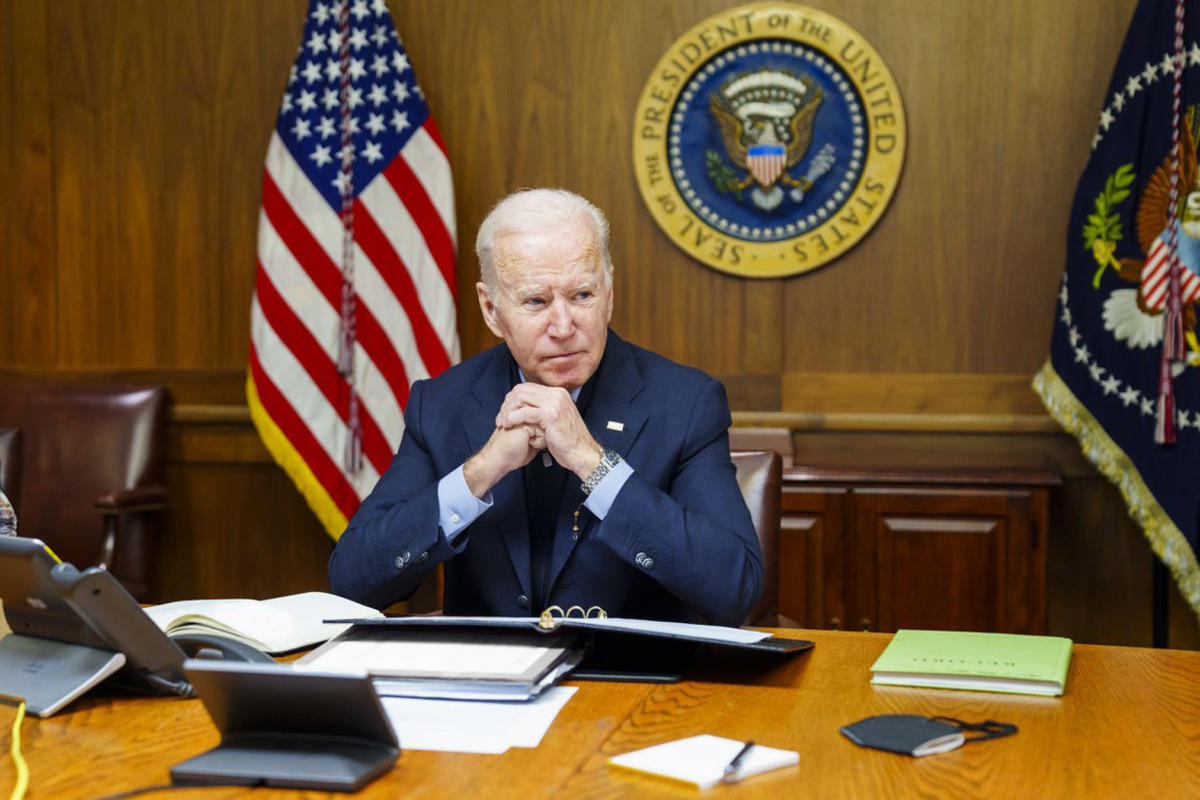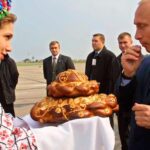
President Joe Biden on Saturday warned Russian President Vladimir Putin that the consequences of a full-scale invasion of Ukraine, which U.S. officials have said could be imminent, would be “swift and severe,” according to a White House description of the conversation.
Biden told Putin that the U.S. and its allies and partners “will respond decisively and impose swift and severe costs” should Moscow move on its neighbor, the White House said.
Biden also reiterated that a Russian invasion would produce “widespread human suffering and diminish Russia’s standing” in the world, the White House said, adding that Biden was “clear with President Putin that while the United States remains prepared to engage in diplomacy, in full coordination with our allies and partners, we are equally prepared for other scenarios.”
The call between the two leaders, which lasted just over an hour, came after the State Department ordered the evacuation of most of its embassy staff in Kyiv. The Pentagon on Saturday also ordered the departure of the 160 members of the Florida National Guard that had been deployed to train Ukrainian forces.
After the call, a senior Biden administration official told reporters it “remains unclear” if Russia is interested in pursuing goals through diplomacy or use of force, while noting that “there was no fundamental change in the dynamic that has been unfolding now for several weeks.”
Biden was “very direct” with Putin about his concern with the safety of Americans who remain in Ukraine, said the official, who described the conversation as “professional” and “substantive.” The two leaders agreed that their teams would stay engaged, the official added.
Yury Ushakov, an aide to Putin, told reporters after the call that the conversation between the two leaders “was quite balanced and businesslike,” noting that Biden mentioned sanctions but the “emphasis was not on this issue” and discussions “around the topic of ‘invasion’ was conducted in a coordinated manner.”
Secretary of State Antony Blinken and Secretary of Defense Lloyd Austin also held calls with their Russian counterparts earlier Saturday.
Russia has massed more than 100,000 troops along the Ukrainian border and conducted military exercises in Belarus, which borders Russia and Ukraine.
Putin strongly denies Western accusations that he is planning an offensive. He has, however, issued bold security demands, including that the U.S. and its allies agree to block Ukraine and other ex-Soviet nations from joining NATO. He also wants NATO to reduce forces in Central and Eastern Europe, as well as offer guarantees that it won’t deploy weapons near Russia’s borders.
Ushakov, the Putin aide, told reporters Saturday that Biden did not provide “any substantive answers” to their demands, including on NATO expansion.
White House national security adviser Jake Sullivan said Friday that the threat of such an incursion is “now immediate enough” that Americans still in Ukraine should leave in the next 24 to 48 hours.
He also reiterated that the Biden administration believes there is a “distinct possibility” Russia could invade its neighbor before the end of the Winter Olympics on Feb. 20, though he stressed that the U.S. did not believe Putin had made a final decision.
“We continue to see signs of Russian escalation, including new forces arriving at the Ukrainian border. As we’ve said before, we are in the window when an invasion could begin at any time should Vladimir Putin decide to order it,” Sullivan told reporters at Friday’s White House briefing.
A U.S. official told NBC News Friday that there is new intelligence about Russia’s military operations that officials find very concerning, making them more worried that an invasion could happen at any time.
The intelligence report found that Moscow has built up about 80 percent of the forces it needs to launch a full-scale invasion and troops have been moving closer to the border, the official said. Russia has also brought in Iskander missiles, a naval presence with land-attack cruise missiles and additional support, including medical, the official added.
The Russian military could take nine different routes into Ukraine in a full-scale invasion, according to a U.S. military and intelligence assessment, and tanks could potentially reach Kyiv, the capital, within 48 hours, NBC News previously reported.
On Saturday, Blinken warned Russian Foreign Minister Sergey Lavrov that if Moscow invades Ukraine, “it would result in a resolute, massive, and united Transatlantic response,” according to State Department spokesperson Ned Price.
A readout of the Lavrov-Blinken call provided by Moscow said the Russian foreign minister had accused Washington of waging a “propaganda campaign” about possible Russian aggression while ignoring key demands made by the Kremlin.
The White House said Friday that Russia had proposed holding a call Monday, but the White House counter-proposed Saturday.
The last time the two leaders spoke was on Dec. 30.




